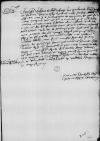Letter #364
Ioannes DANTISCUS to Lazarus [GYRLACH?]Valladolid, 1527-08-17
Manuscript sources:
Auxiliary sources:
Prints:
| ||||||||||||||||
Text & apparatus & commentary Plain text Text & commentary Text & apparatus
Carissime Lazare.
Salutem.
Accepi hic paulo ante litteras tuas et
Ceterum volo, ut de pecuniis, quas habueris ex hoc anno praeterito, des domino
Datum ex
